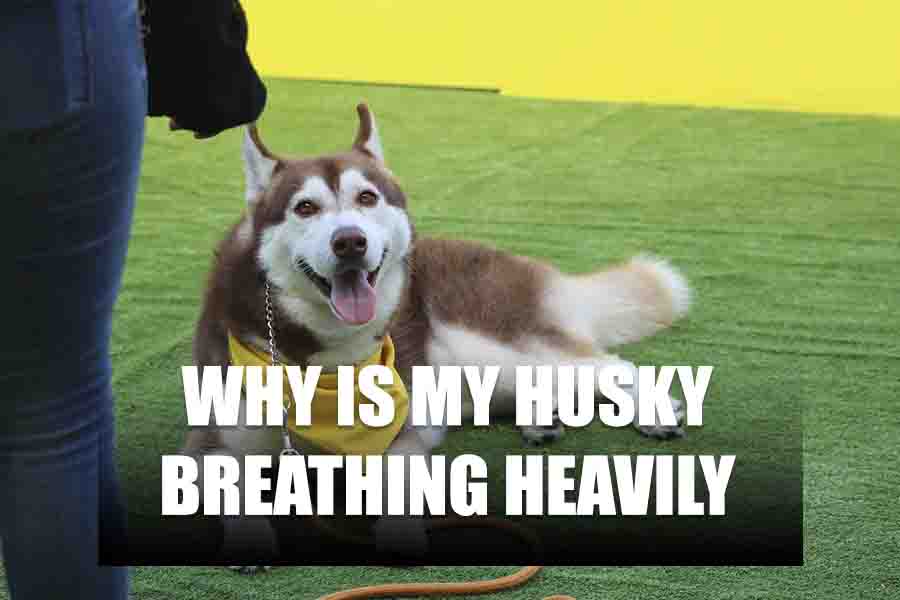The distinctive and striking appearance of Siberian Huskies captures the hearts of many dog enthusiasts. However, those who share their lives with these magnificent creatures may occasionally be concerned when their Huskies exhibit heavy breathing. While heavy breathing can be a normal response to exertion, it can also signal underlying health issues. This article explores why your Husky might be breathing heavily, exploring common triggers and potential medical concerns. Understanding the causes of heavy breathing is crucial for ensuring the well-being and happiness of your beloved canine companion.
Why Is My Husky Breathing Heavily?
Huskies, known for their boundless energy, may breathe heavily after physical activity, which is usually normal. However, heavy breathing can also result from hot weather, stress, obesity, allergies, infections, or underlying health conditions. Monitoring your Husky’s breathing and looking for signs of distress is essential. If heavy breathing persists or is accompanied by concerning symptoms, consult a veterinarian to rule out any serious issues and ensure your Husky’s well-being.
Common Causes Of Heavy Breathing In Huskies
Physical Exertion and Exercise: Huskies are known for their boundless energy and love for physical activity. After a vigorous run or play session, it’s entirely normal for them to pant heavily. This helps regulate their body temperature and cool down, as they have a thick double coat designed for cold weather.
High Temperatures and Heat Exhaustion: Huskies can struggle in hot weather despite their cold-weather origins. Their thick fur and insulation make them susceptible to overheating. They may pant excessively to release heat and avoid heat-related issues like heatstroke when exposed to high temperatures.
Stress and Anxiety: Huskies are emotionally sensitive dogs and can react strongly to stressors. Anxiety-inducing situations such as thunderstorms, fireworks, or separation from their owners can trigger heavy breathing as a response to their heightened emotional state.
Obesity and Overweight Huskies: Excess weight strains a Husky’s respiratory system. Overweight Huskies may pant heavily even during routine activities due to the extra effort required to move their bulk. Weight management is crucial to alleviate this issue.
Allergies and Respiratory Irritants: Huskies can be prone to allergies like other breeds. Exposure to allergens like pollen, dust, or certain foods can lead to respiratory discomfort and heavy breathing. Identifying and managing these allergies is essential.
Infections and Respiratory Illnesses: Respiratory infections, such as kennel cough or bronchitis, can cause Huskies to experience heavy breathing, coughing, and other symptoms. Timely veterinary care is necessary to treat such conditions.
Chronic Conditions like Collapsing Trachea: Some Huskies may develop chronic conditions like a collapsing trachea, where their windpipe narrows, making breathing harder. This can result in heavy breathing, especially during exercise or excitement.
Smoke and Poor Air Quality: Huskies are particularly sensitive to poor air quality. Exposure to smoke, pollution, or airborne irritants can lead to heavy breathing episodes, especially if they have pre-existing respiratory sensitivities.
Air Travel and Altitude: Changes in altitude during air travel can affect a Husky’s breathing patterns. It’s essential to acclimate them gradually and ensure proper ventilation during flights.
Normal Breathing In Huskies
Their unique physiology and activity level influence normal breathing in Huskies. Understanding what is expected can help you gauge your Husky’s respiratory health and recognize when something might be amiss. Here’s a more in-depth look at normal breathing in Huskies:
Efficient Respiratory System:
Huskies are a breed known for their stamina and endurance. They possess a well-developed respiratory system that allows for efficient oxygen exchange. Their average respiratory rate is generally higher than in other dog breeds, allowing them to take in more oxygen during physical activities.
Double Coat and Thermoregulation:
Huskies have a dense double coat designed to protect them from extreme cold. While beneficial in cold climates, this coat can make them susceptible to overheating in hot weather. As a result, Huskies often rely on panting as a primary means of cooling down. Their heavy panting helps regulate their body temperature by dissipating excess heat.
Post-Exercise Panting:
After vigorous exercise or play, Huskies commonly engage in heavy panting. This is a natural response to exertion and helps them cool down. You may notice their tongues hanging out and saliva production during this time. This behavior is considered ordinary and necessary for heat dissipation.
Seasonal Adaptations:
Huskies adjust their breathing rate according to environmental conditions. Their breathing may be slower and more steady in colder weather, conserving energy. Conversely, their breathing rate increases significantly in hot weather to help them cope with the higher ambient temperature.
Quiet Breathing at Rest:
When Huskies are at rest, their breathing should be quiet and unlabored. Normal resting breathing should not produce loud or raspy sounds. Peaceful breathing is a sign of their overall good health.
Nostril Flaring:
You might observe nostril flaring in Huskies during intense physical activity or exercise. This is a normal response as their nostrils widen to accommodate the increased demand for oxygen, allowing for more efficient airflow.
Sleep Patterns:
Like most dogs, huskies typically exhibit regular and steady breathing patterns during sleep. Observing irregular or labored breathing during sleep could indicate an underlying issue that requires attention.
What Factors That Can Influence Breathing?
Several factors can influence a dog’s breathing, including Huskies. Understanding these factors is essential for recognizing when your Husky’s breathing might deviate from the norm. Here are some key factors that can influence a Husky’s breathing:
- Physical Activity and Exercise: Intense physical activity, such as running or playing vigorously, can increase a Husky’s breathing rate. This is a natural response to the higher demand for oxygen and energy during exercise.
- Temperature and Weather: Temperature and weather conditions significantly affect a Husky’s breathing. In hot weather, they may breathe more rapidly to cool down; in cold weather, their breathing may slow down to conserve energy.
- Stress and Anxiety: Emotional states like stress and anxiety can affect a Husky’s breathing. Stressors such as thunderstorms, fireworks, or separation anxiety can lead to heavy panting or rapid breathing.
- Weight and Fitness Level: A Husky’s weight and overall fitness level can impact their breathing. Overweight Huskies may struggle with heavier breathing due to the extra strain on their respiratory system.
- Age: Age can influence a Husky’s breathing patterns. Puppies and younger Huskies tend to have higher respiratory rates than older dogs. Senior Huskies may experience changes in their breathing due to age-related conditions.
- Allergies and Respiratory Irritants: Allergens like pollen, dust, or certain foods can trigger allergies in Huskies, leading to heavy or labored breathing. Exposure to respiratory irritants in the environment can also affect their breathing.
- Infections and Respiratory Illnesses: Respiratory infections like kennel cough or pneumonia can cause coughing and labored breathing. These infections often require veterinary treatment.
- Underlying Health Conditions: Chronic conditions like collapsing trachea, heart disease, or lung disorders can influence a Husky’s breathing. These conditions may require ongoing management and medical attention.
When To Seek Veterinary Care?
Knowing when to seek veterinary care for your Husky is essential for maintaining their health and well-being. While some situations warrant immediate attention, others require monitoring or a scheduled veterinary visit. Here are some key indicators of when to seek veterinary care for your Husky:
If your Husky is experiencing rapid, shallow, or labored breathing that doesn’t improve within a few minutes, especially if accompanied by signs of distress or anxiety, seek immediate veterinary care. Labored breathing can indicate underlying issues, including respiratory problems, heart conditions, or heatstroke.
If your Husky’s tongue, gums, or other mucous membranes turn bluish or purplish, it could indicate a severe lack of oxygen. This is a medical emergency; you should contact your vet or an emergency clinic immediately.
If your Husky develops a persistent cough that lasts for more than a day or is accompanied by other concerning symptoms like lethargy, loss of appetite, or discharge from the nose or eyes, consult your veterinarian. Chronic coughing can indicate respiratory infections, allergies, or other underlying issues.
If your Husky is panting excessively, restless, and unable to settle down, especially in hot weather, it could indicate heat exhaustion or heatstroke. This requires immediate attention to prevent life-threatening complications.
If you notice a sudden and significant change in your Husky’s breathing pattern, such as rapid, shallow breaths or prolonged periods of heavy panting unrelated to exercise, consult your veterinarian. Changes in breathing can indicate various health issues, including heart or lung conditions.
If your Husky sustains any injuries, including cuts, wounds, fractures, or injuries from accidents, seek immediate veterinary care. Injuries may not always be externally visible, so it’s crucial to have them examined by a professional.
Frequent or severe vomiting and diarrhea can lead to dehydration and other health problems. Contact your veterinarian for guidance and potential treatment if your Husky experiences persistent or severe gastrointestinal issues.
If your Husky has a seizure, seeking immediate veterinary care is essential. Seizures can have various causes, and a veterinarian can help diagnose and manage the underlying condition.
FAQ’s
How long can Husky live?
Huskies typically have a 12 to 14-year lifespan, but individual lifespans can vary based on genetics, diet, exercise, and healthcare. Proper care can help extend their life.
How fast should a husky breathe?
A Husky’s normal resting rate is 10 to 30 breaths per minute. It can increase during exercise or in response to heat or stress. If you’re concerned about their breathing rate, consult a vet.
What are the signs of anxiety in dogs?
Signs of anxiety in dogs include excessive barking, panting, trembling, restlessness, and avoiding eye contact. They may also exhibit destructive behavior or have accidents indoors. If you notice these signs, consult a veterinarian or dog behaviorist.





Leave a Reply